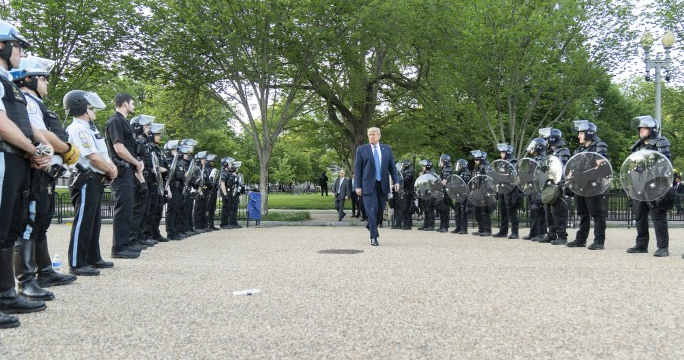America’s Reality-Show Election: Trump vs. Anarchy?
Authoritarians love to leverage security, and Donald Trump would rather run against anarchy than against Joe Biden.

Lisa Van Dusen/For the Hill Times
June 11, 2020
Like many journalists, some of my earliest professional experiences involved dealing with the police. As a radio reporter working the late shift in Vancouver, I learned to navigate both the technicalities of my police scanner and the legalities of police reporting, and to respect the officers I dealt with both behind desks and at crime scenes. They were brave, competent human beings with difficult, unimaginably stressful jobs.
In recent years, as an editor and columnist, especially covering international affairs, I’ve also been routinely reminded that when democracies are debased, the use of police as political proxies is one of the first indicators of major trouble. It’s why, when I see police in America, where I’ve spent a significant percentage of my adult life, modelling the viral domination tactics of Donald Trump, I shudder.
Trump’s presidency is one manifestation of the degradation of democracy worldwide. Others include: the hyper-corruption lubricating change that democratic checks and balances once prevented; the post-truth fogging content disseminated by Facebook; the corruption and hacking of election narratives to deliver anti-democracy outcomes; the staging of chaos to demoralize citizens and make democracy seem dangerous; and the use of narrative warfare to produce results that once required major sacrifices of blood and treasure.
On the security front, the trend has been the massive expansion of intelligence agencies globally and the militarization of police forces. From Beijing to Manila to Hong Kong, police are, increasingly, serving the state rather than the public. In Washington, an impeached reality-show president in a White House surrounded by perimeter fencing and rent-a-cops makes the 2020 election a choice between a performative authoritarian coup and Joe Biden stopping this lunacy. The pre-existing problem of police brutality as a racist fact of life for Black people in North America, horrifyingly advertised for the millionth time by the murder of George Floyd, has crystallized the stakes.
Reimagining policing and reassessing police budgets makes eminent sense to swing the power pendulum back toward social equilibrium. Otherwise, as in Hong Kong and elsewhere, police become expensive security guards maintaining order against the justified anger of people disenfranchised by their own government.
But the slogan “Defund the Police” enables the propaganda technique of using loaded words as a wedge, a cudgel, and a diversion from a rational debate. It will be repurposed by a candidate eager to divide the Democratic Party and the electorate, to portray the people, rather than himself, as the cause of the chaos, and to reframe the election question as Trump versus anarchy instead of Trump versus Biden.
You can tell a lot about a society based on what its people fear. I’ve covered people who fear bullying governments, barbaric non-state actors, and corrupt political machines. I’ve seen people avoid criticizing intelligence agencies for fear of having their lives ruined by hacking and surveillance and withhold criticism of certain politicians for fear of joining a long list of retaliation victims. I’ve watched fear weaponized as a form of censorship, oppression, behaviour modification, and reputational Kevlar. The only way to fight systemic fear is the same way you fight systemic racism: collectively.
In non-democracies, power is concentrated in the hands of interests who use fear to protect that power. In America, we’re watching that concentration happen in real time—power being sucked away from voters, from the media, from Congress, from the legal system, and even from the military, and toward interests who think they’re firewalled by a combination of corruption, chaos, and intimidation.
Donald Trump is trying to turn America into a place where people fear not just the police but their own president. That’s not politics, it’s the kind of war governments that used to only exist elsewhere wage against their own people.
Lisa Van Dusen is associate editor of Policy Magazine and a columnist for The Hill Times. She was Washington bureau chief for Sun Media, international writer for Peter Jennings at ABC News, and an editor at AP in New York and UPI in Washington.
